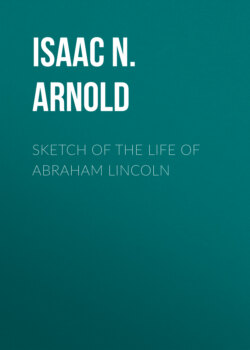Читать книгу Sketch of the life of Abraham Lincoln - Isaac N. Arnold - Страница 5
На сайте Литреса книга снята с продажи.
LINCOLN IN CONGRESS.
ОглавлениеTable of Contents
On the 6th of December, 1847, Mr. Lincoln took his seat in Congress. Mr. Douglas, who had already run a brilliant career in the lower House of Congress, at this same session took his seat in the Senate. Mr. Lincoln distinguished himself by able speeches upon the Mexican War, upon Internal Improvements, and by one of the most effective campaign speeches of that Congress in favor of the election of General Taylor to the Presidency. He proposed a bill for the abolition of slavery at the National capital. He declined a re-election, and was succeeded by his friend, the eloquent E. D. Baker, who was killed at Ball's Bluff.
In 1852, he lead the electoral ticket of Illinois in favor of General Scott for President. Franklin Pierce was elected, and Mr. Lincoln remained quietly engaged in his professional pursuits until the repeal of the Missouri Compromise in 1854. This event was the beginning of the end of slavery. "It thoroughly roused the people of the Free States to a realization of the progress and encroachments of the slave power, and the necessity of preserving 'the jewel of freedom.'" From that hour the conflict went on between freedom and slavery, first by the ballot, and all the agencies by which public opinion is influenced, and then the slave-holders, seeing that their supremacy was departing, sought by arms to overthrow the government which they could no longer control.
Mr. Lincoln, while a strong opponent of slavery, had up to this time rested in the hope that by peaceful agencies it was in the course of ultimate extinction. But now seeing the vast strides it was making, he became convinced its progress must be arrested or that it would dominate over the republic, and Slavery would become "lawful in all the States." From this time he gave himself with solemn earnestness to the cause of liberty and his country. He forgot himself in his great cause. He did not seek place, if the great cause could be better advanced by the promotion of another; hence his promotion of the election of Trumbull to the United States Senate.
This unselfish devotion to principle was a great source of his power. Placing himself at the head of those who opposed the extension of, and who believed in the moral wrong of slavery, he entered upon his great mission with a singleness of purpose, an eloquence and power, which made him as the advocate of freedom, the most effective and influential speaker who ever addressed the American people.
He brought to the tremendous struggle between freedom and slavery physical strength and endurance almost superhuman. Notwithstanding his modesty and the absence of all self-assertion, when we review the conflict from 1854 to 1865, when the struggle closed by the adoption of the constitutional amendment abolishing and prohibiting slavery forever throughout the republic, it is clear that Lincoln's speeches and writings did more to accomplish this result than any other agency.
Following the repeal of the Missouri Compromise came the Kansas struggle, and the organization of a great party to resist the encroachments and aggressions of slavery. The people instinctively found the leader of such a party in Lincoln.
Looking over the whole ground, with the sagacity which marked his far-seeing mind, he saw that the basis upon which to build were the grand principles of the Declaration of Independence. This foundation was broad enough to include old-fashioned Democrats who sympathized with Jefferson in his hatred of slavery; Whigs who had learned their love of liberty from the utterances of the Adamses and Channings, and the earlier speeches of Webster; and anti-slavery men, who recognized Chase and Sumner as their leaders.
He now addressed himself to the work of consolidating out of all these elements a party, the distinctive characteristics of which should be the full recognition of the principles of the Declaration of Independence and hostility to the extension of Slavery. This was the party which in 1856 gave John C. Fremont 114 electoral votes for President, and in 1860, elected Lincoln to the executive chair.
